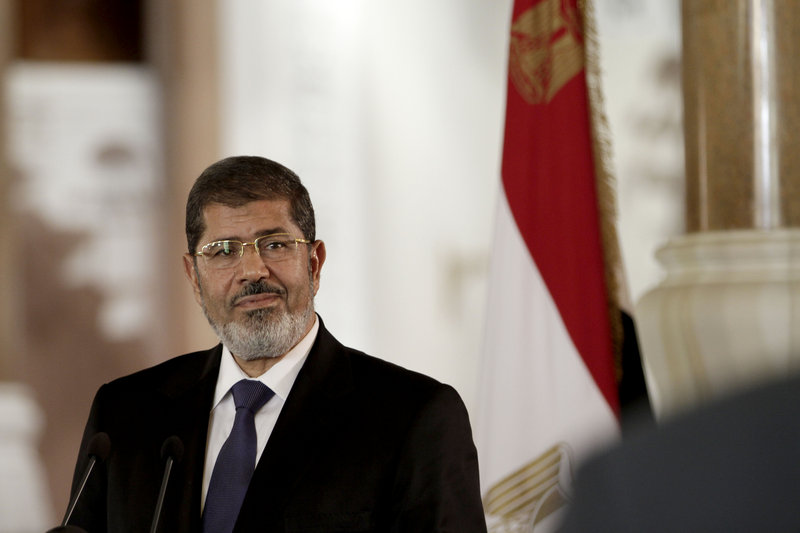CAIRO – Egyptian President Mohamed Morsi took extensive new powers for himself Thursday, freeing his decisions from judicial review and threatening retrials for former top officials, including ex-president Hosni Mubarak.
The decree, issued a day after Morsi won international praise for fostering a cease-fire in Gaza, appears to leave few if any checks on his power. The president said all of the decisions he has made since he took office in June — and until a new constitution is adopted and a parliament elected — were final and not subject to appeal or review.
The announcement, read on state television by Morsi’s spokesman and broadcast repeatedly, accompanied by nationalistic songs, shocked many in this struggling country and street protests quickly erupted.
Morsi’s broad assertion of control came less than 24 hours after a diplomatic triumph in arranging the cease-fire in Gaza had given new credence to Morsi’s international bona fides. And it raised questions about whether the country might be headed to a return of its Mubarak-era role on the world stage: a country praised for bringing stability to a volatile region and tolerated for abusing rights at home.
Muslim Brotherhood officials, with whom Morsi is allied, said the measures were necessary to ensure the country’s full and healthy return to democracy.
“This level of immunity for presidential decrees is indeed unprecedented, but it is necessary and it is controlled by a time frame” that ends with the election of a new parliament, said Gehad el-Haddad, a senior Muslim Brotherhood adviser. “This constitutional declaration cements the way forward in terms of time frame and powers.”
But the decision raised immediate concerns among many liberal activists who were already worried that Morsi had taken a distinctly authoritarian air in the three months since he swept out the top ranks of the military and sidelined what had long been a powerful independent institution in Egypt. Egypt’s short-lived parliament was dismissed by the country’s high court shortly before Morsi took power, so legislative powers also are concentrated under the president. Taking the courts out of the equation means there will be no judicial review of Morsi’s decisions.
Morsi was elected in June, narrowly triumphing over a Mubarak-era cabinet minister, Ahmed Shafiq, with 52 percent of the vote.
“The president may take the necessary actions and measures to protect the country and the goals of the revolution,” the decree read in part.
“Morsi today … appointed himself Egypt’s new pharaoh,” wrote former liberal presidential candidate Mohamed ElBaradei on Twitter. “A major blow to the revolution that could have dire consequences.”
The implications on the international stage seemed less clear, and any American response was muted because of the Thanksgiving holiday. Just hours before the announcement, Morsi had been winning plaudits from Israel, Hamas and the United States for having brokered a cease-fire between Israel and Hamas, the Muslim Brotherhood offshoot that rules the Palestinian enclave of the Gaza Strip. Over Tuesday and Wednesday, Morsi and President Obama spoke by telephone three times, White House officials said.
“Morsi chose an interesting time to issue this decree, right after this success with the Gaza cease-fire,” said Shadi Hamid, an Egypt expert at the Brookings Doha Center in Qatar. “In some ways, there is a real danger of returning to the Mubarak-era situation where the U.S. really cares about the foreign policy and turns a blind eye to domestic abuses.”
But Hamid also noted that Morsi has had broad unilateral power since the August military overhaul but had not frequently exercised it.
In the decree, Morsi declared the retrial of senior officials accused in the deaths of protesters during the country’s 2011 revolution, a measure that appeared targeted at Mubarak and his associates. And he dismissed Egypt’s Mubarak-era prosecutor general, immediately swearing in a new one.
Morsi also said the Islamist-dominated body that is drafting a new constitution could not be dismissed and extended its mandate by two months. It now has until February to finish its work. The constitution is expected to be put to a referendum, followed by legislative elections.
Minutes before the decree was announced in Cairo late Thursday afternoon, Muslim Brotherhood supporters of Morsi gathered in front of the country’s high court. They chanted in favor of broader measures against a judiciary that remains dominated by Mubarak-era appointees.
But a competing crowd filled Tahrir Square. Some demonstrators brandished posters with split images of the faces of Mubarak and Morsi.
The attention of the world over the last week was focused on Egypt’s dramatic intercession to end the Israeli bombardment of the Gaza Strip and stop Palestinian rockets from being fired into Israel. But at home, the body writing the country’s new constitution was fracturing over disputes about the role of religion in the document. Tahrir Square filled with demonstrators protesting economic problems and the acquittals and light sentences of Mubarak-era officials on charges of corruption and human rights abuses.
Send questions/comments to the editors.



Success. Please wait for the page to reload. If the page does not reload within 5 seconds, please refresh the page.
Enter your email and password to access comments.
Hi, to comment on stories you must . This profile is in addition to your subscription and website login.
Already have a commenting profile? .
Invalid username/password.
Please check your email to confirm and complete your registration.
Only subscribers are eligible to post comments. Please subscribe or login first for digital access. Here’s why.
Use the form below to reset your password. When you've submitted your account email, we will send an email with a reset code.